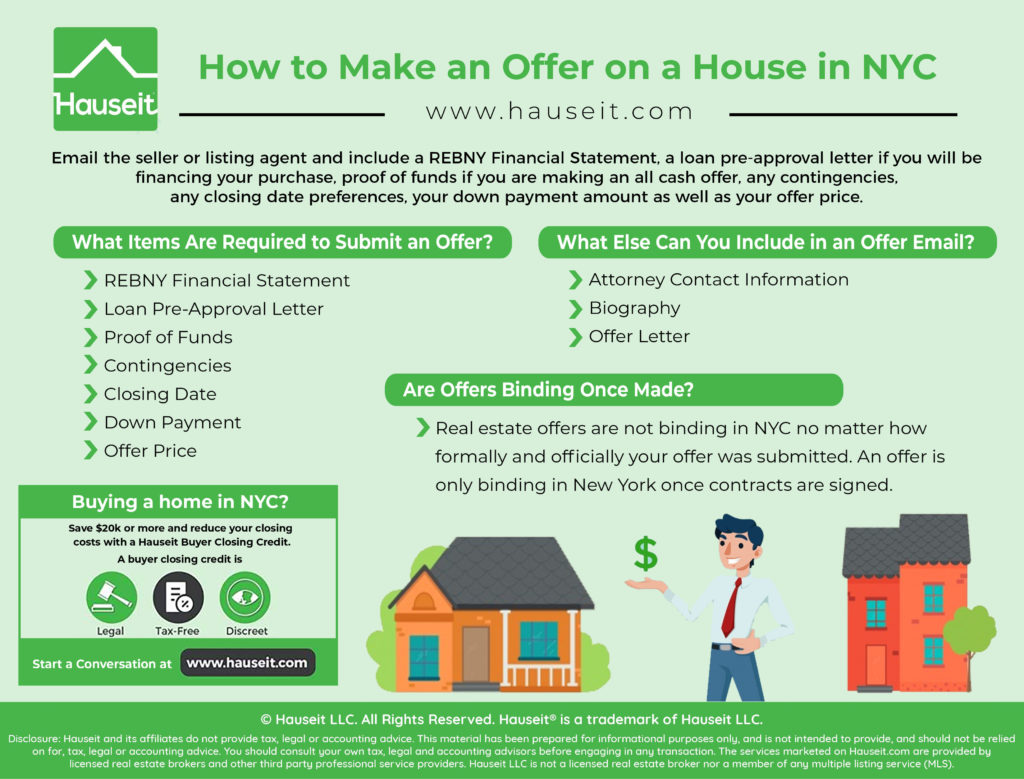Making an offer on a house in NYC is as simple as emailing the seller or listing agent and including a REBNY Financial Statement, a loan pre-approval letter if you will be financing your purchase, proof of funds if you are making an all cash offer, any contingencies, any closing date preferences, your down payment amount as well as your offer price.
We’ll explain in detail how to make an offer on a house in NYC in the following article, and go over some additional items you can include in your email to make your offer more credible.
Table of Contents:

REBNY Financial Statement
This is a standardized, personal financial statement used by real estate agents in NYC. This form provides a snapshot and summary of the buyer’s finances, and details the buyer’s income, assets and liabilities.
This form is required if you are financing your purchase, and will often be asked for even if you are purchasing all cash.
You can download a REBNY Financial Statement Template here.
Loan Pre-Approval Letter
This is required to submit an offer if you are planning on getting a mortgage or loan. The listing agent will want to see that a credible financial institution has already partially underwritten your file and has initially approved you for a loan. Please understand the difference between a prequalification letter vs pre-approval letter. The latter is much more serious and is what you’ll need to submit with any offer letter.
Proof of Funds
This is only typically required for all cash buyers and can consist of a bank or investment account statement that demonstrates sufficient cash to complete the purchase. It can also help reassure the seller that you’re serious about buying if you provide proof of funds even if you are getting a loan. You can cross out sensitive account numbers.
Contingencies
The most common contingency you’ll see in NYC is the mortgage or financing contingency. This contingency allows buyers to back out of a signed contract if they are unable to secure a commitment lender within a certain number of days. It’s sufficient to just ask for a financing or mortgage contingency without going into further detail at this stage.
Closing Date
This can be important if you have a lease on your current apartment expiring soon or if you’re trying to coordinate a 1031 exchange. Alternatively, you don’t have to include this section or you can even say that you’re flexible in terms of closing date to make your offer more digestible for the seller.
Down Payment
It’s standard practice to say how much you will be putting down, even if you’re not totally sure yet at this early stage. You can always say that you’re able to put up to a certain percent or dollar amount down, even if you end up putting a down a smaller down payment.
Offer Price
You obviously can’t submit an offer without an offer price. This is the most important part of the offer email and is often mentioned at the beginning. If your offer price is the same as the asking price or above it, then this fact is often highlighted and bolded in offer emails.
Get a 2% Rebate When You Buy
Save thousands on your home purchase with a buyer agent commission rebate from Hauseit
Attorney Contact Information
While it’s not absolutely required to include the buyer’s attorney’s contact information at the offer stage, it’s nice to do so if you already have a lawyer lined up.
This demonstrates seriousness on your part and credibility that your lawyer truly is ready to review a contract ASAP. We discuss the questions you should ask your NYC real estate attorney in this article.
If you don’t have an attorney yet, you can always just say in the offer email that you’re happy to send over the buyer’s lawyer contact information if there is something to do, and that they buyer has an experienced real estate lawyer on standby ready to review the contract immediately.
Biography
While not absolutely required, it’s nice to give the seller an idea of who you are. You don’t need to go crazy with this if you do decide to include a biography. A paragraph or two maximum will be totally sufficient.
Offer Letter
Some home buyers go a step further and include a personal letter to the seller. This letter is often used to give the seller a more personalized introduction to the buyers, and to personally explain who the buyers are. A highly personal, touching home buyer offer letter can help buyers win a bidding war if other offers are roughly equivalent.
Save 2% On Your Home Purchase
Save thousands on your home purchase with a buyer agent commission rebate from Hauseit






